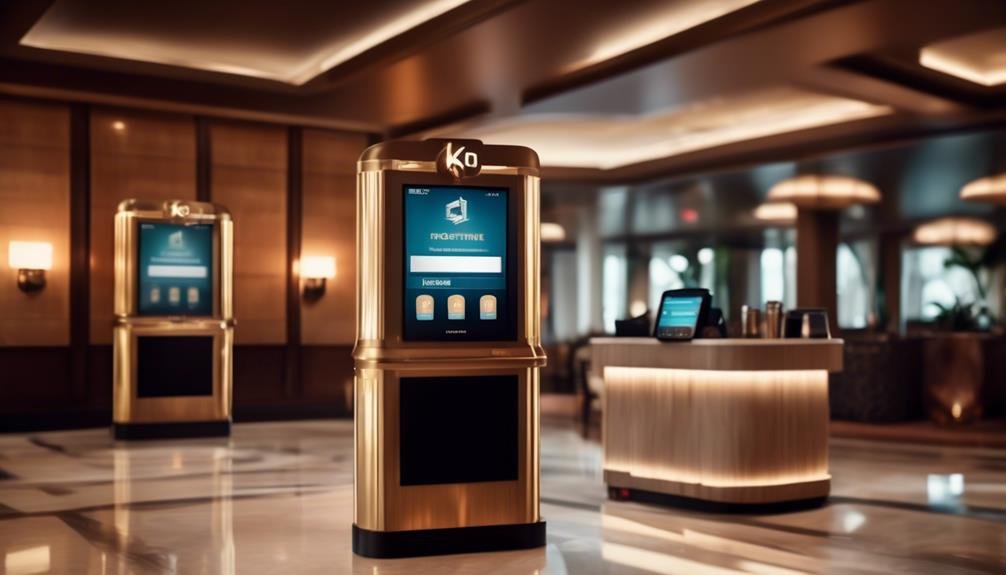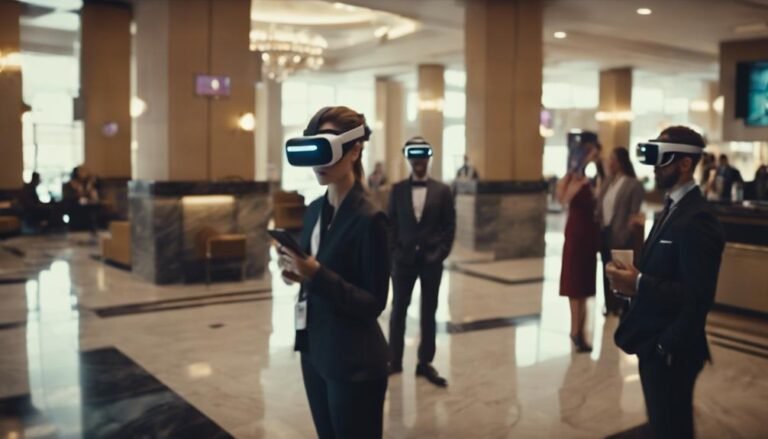Hospitality in the Digital Era: Adapting to New Trends
In the digital era, the hospitality industry is akin to a chameleon, constantly adjusting its colors to blend seamlessly with the ever-evolving landscape of technology.
As you navigate this dynamic environment, you'll find yourself encountering a myriad of new trends that demand adaptation in order to stay relevant.
From the rise of online booking platforms to the integration of AI-powered customer service, the hospitality sector is undergoing a significant transformation.
But how exactly are these changes shaping the guest experience and the way we do business?
Join us as we explore the intricacies of hospitality in the digital era and uncover the strategies that are reshaping the industry.
Key Takeaways
- Online booking and payment platforms have revolutionized the reservation process, making it simpler and more convenient for customers.
- Personalized guest experiences, based on guest preferences and data, can enhance customer loyalty and satisfaction, leading to higher likelihood of return visits.
- Mobile check-ins and digital payments streamline the arrival process, provide contactless solutions for health and safety concerns, and improve guest loyalty and positive reviews.
- AI-powered customer service offers 24/7 availability, predictive analytics for personalized suggestions, efficient query resolution, and enhanced personalization for exceptional guest experiences.
Online Booking Platforms
In the rapidly evolving digital landscape, online booking platforms have revolutionized the way customers interact with the hospitality industry, simplifying the reservation process and providing unparalleled convenience. With the integration of secure online payment systems, customers can now complete their transactions seamlessly, enhancing the overall booking experience. This not only streamlines the process for guests but also improves operational efficiency for hospitality providers.
Moreover, customer reviews play a pivotal role in the decision-making process for potential guests. Online booking platforms allow for the transparent dissemination of customer feedback, enabling prospective visitors to make informed choices based on the experiences of previous guests. This social proof not only builds trust but also encourages continuous improvement within the industry, as businesses strive to meet and exceed customer expectations.
As the digital era continues to unfold, the significance of online booking platforms can't be overstated. Their ability to facilitate secure transactions and provide access to authentic customer reviews positions them as essential tools for both customers and hospitality businesses, shaping the future of the industry.
Personalized Guest Experiences
Guests expect a personalized and tailored experience that caters to their individual preferences and needs in today's digital hospitality landscape. This trend is reshaping the way hotels and resorts operate, requiring an understanding of each guest's unique requirements.
By leveraging data and technology, hospitality providers can offer customized amenities and tailored recommendations that enhance the overall guest experience.
- Customized Amenities: Guests now anticipate amenities that are personalized to their preferences, such as room temperature settings, pillow options, and preferred room service items.
- Data-Driven Personalization: Utilizing guest data can enable hotels to anticipate needs and offer personalized experiences, from room preferences to leisure activities suggestions.
- Tailored Recommendations: By analyzing guest behavior and preferences, hotels can provide tailored recommendations for dining, local attractions, and personalized leisure activities.
- Enhanced Customer Loyalty: Personalized experiences lead to higher customer satisfaction and loyalty, as guests feel valued and understood, increasing the likelihood of return visits and positive reviews.
Mobile Check-Ins
Embracing mobile check-ins revolutionizes the guest experience, streamlining the arrival process and providing seamless access to personalized accommodations and services. Contactless solutions have become increasingly vital in the hospitality industry, and mobile check-ins offer an efficient way to minimize physical contact during the check-in process. This not only aligns with current global health and safety concerns but also enhances overall guest satisfaction.
With the integration of digital payments, mobile check-ins enable guests to complete the check-in process and make payments using their smartphones, eliminating the need for physical credit cards or cash transactions. This not only adds a layer of convenience but also ensures a secure and efficient payment process. Data-driven insights show that guests appreciate the speed and convenience of mobile check-ins, leading to improved guest loyalty and positive reviews.
Looking ahead, the future of hospitality lies in embracing technology to enhance guest experiences. By leveraging mobile check-ins and integrating digital payments, hotels can position themselves at the forefront of innovation, meeting the evolving needs of today's tech-savvy travelers while prioritizing safety and convenience.
AI-Powered Customer Service
Leveraging the latest advancements in technology, AI-powered customer service introduces a new dimension to the guest experience, offering personalized and efficient interactions that build on the seamless access provided by mobile check-ins. AI powered chatbots have revolutionized customer service in the hospitality industry. Here's how they're shaping the future:
- 24/7 Availability: AI powered chatbots are available round the clock to assist guests with inquiries, bookings, and personalized recommendations, enhancing customer satisfaction and loyalty.
- Predictive Analytics: By analyzing guest data and preferences, AI can anticipate needs and offer proactive suggestions, creating a more tailored and personalized experience for each guest.
- Efficient Query Resolution: AI chatbots can quickly and accurately handle a high volume of guest queries and requests, improving operational efficiency and freeing up staff to focus on more complex tasks.
- Enhanced Personalization: Through predictive analytics, AI can offer personalized recommendations for dining, activities, and amenities, creating a tailored experience that exceeds guest expectations.
AI-powered customer service isn't just a trend; it's a strategic imperative for hospitality businesses aiming to provide exceptional guest experiences in the digital era.
Data-Driven Marketing Strategies
You can harness data to create personalized customer experiences, allowing you to tailor your services and offerings to individual preferences.
By utilizing data-driven marketing strategies, you can target advertising campaigns with precision, reaching the right audience at the right time with the right message.
Furthermore, analyzing consumer behavior through data can provide valuable insights that inform strategic decision-making and enhance the overall guest experience.
Personalized Customer Experiences
How can businesses harness customer data to create personalized experiences that drive engagement and loyalty in the digital era?
By leveraging data-driven marketing strategies, businesses can tailor interactions and provide customized recommendations to meet the specific needs and preferences of individual customers.
Here's how you can achieve this:
- Utilize customer behavior data to understand preferences and anticipate needs
- Implement AI-driven personalization to deliver relevant content and offers in real-time
- Leverage predictive analytics to anticipate future customer needs and desires
- Continuously refine and update customer profiles based on interactions and feedback
Targeted Advertising Campaigns
In adapting to the digital era, businesses can capitalize on customer data to craft targeted advertising campaigns that resonate with individual preferences and behaviors.
AI-driven targeting has revolutionized the way businesses approach their advertising strategies. By leveraging advanced algorithms, businesses can analyze vast amounts of customer data to identify specific demographics, interests, and purchasing behaviors.
This enables the creation of highly personalized and effective social media campaigns that are more likely to capture the attention of potential customers. The ability to tailor advertising content to the unique preferences of individuals enhances the overall customer experience and significantly increases the likelihood of conversion.
As businesses continue to embrace data-driven marketing strategies, the use of AI-driven targeting in social media campaigns will undoubtedly play a pivotal role in maximizing advertising effectiveness and return on investment.
Analyzing Consumer Behavior
and help in crafting personalized marketing approaches.
Purchase decisions can be influenced by analyzing consumer behavior, allowing businesses to create targeted strategies that drive conversions.
Virtual Reality in Hospitality
Virtual reality (VR) is revolutionizing the hospitality industry by providing immersive guest experiences and virtual tours. This allows potential guests to explore accommodations and facilities from the comfort of their homes.
In addition, VR technology offers interactive training programs for staff. These programs enhance their skills and knowledge in a dynamic, engaging manner.
Immersive Guest Experiences
Immerse your guests in unforgettable experiences through the integration of virtual reality technology within the hospitality industry. By leveraging immersive storytelling techniques and sensory experiences, you can elevate guest engagement and satisfaction to new heights.
Here's how you can achieve this:
- Personalized Virtual Tours: Offer interactive virtual tours of your property, allowing guests to explore accommodations, amenities, and local attractions before their arrival.
- Immersive Dining Experiences: Create virtual reality dining experiences that transport guests to unique settings while enjoying their meals.
- Virtual Concierge Services: Provide virtual reality concierge services for guests to preview and book activities, enhancing their pre-arrival excitement.
- Immersive Event Experiences: Host virtual reality events or conferences, enabling remote attendees to feel fully immersed in the occasion.
Virtual Tours
To further enhance guest engagement and satisfaction, the hospitality industry is now incorporating virtual reality technology into the realm of virtual tours, providing an immersive and interactive way for guests to explore accommodations, amenities, and local attractions prior to their arrival.
Virtual reality adoption in hospitality is revolutionizing the way guests experience and interact with their potential stays. According to recent data, properties offering virtual tours have seen a significant increase in booking rates, with a notable 85% of guests expressing a preference for venues that provide immersive experiences through virtual reality.
This trend is expected to continue growing as technology advances, with hotels, resorts, and other hospitality establishments increasingly investing in virtual reality to showcase their offerings and provide potential guests with a more realistic and captivating preview of their experiences.
Interactive Training Programs
Incorporating interactive training programs utilizing virtual reality technology has proven to enhance staff retention, improve operational efficiency, and elevate the overall guest experience within the hospitality industry. This approach leverages gamified learning and interactive simulations to create immersive training experiences for employees.
Here are some key benefits of interactive training programs:
- Increased Engagement: Virtual reality training captures the attention of employees, leading to higher engagement and knowledge retention.
- Realistic Simulations: Interactive simulations allow staff to practice real-life scenarios in a safe, controlled environment, enhancing their skills and confidence.
- Cost-Effective Training: Virtual reality eliminates the need for physical training setups, reducing costs associated with traditional training methods.
- Adaptable Learning: Employees can learn at their own pace, making the training experience more personalized and effective.
Sustainable Practices in the Digital Era
As the hospitality industry navigates the digital era, integrating sustainable practices has become increasingly essential for maintaining competitiveness and meeting the evolving expectations of environmentally conscious consumers. Eco-friendly amenities and green technology integration are pivotal in this pursuit.
According to a recent study, 78% of travelers are more likely to choose an eco-friendly accommodation option, showing a clear demand for sustainable practices. Embracing this trend not only aligns with consumer preferences but also presents a significant opportunity for cost savings. Implementing energy-efficient technologies, such as smart thermostats and LED lighting, can lead to substantial reductions in operational expenses while demonstrating a commitment to environmental responsibility.
Furthermore, adopting sustainable practices can enhance the overall guest experience, contributing to positive reviews and customer loyalty. As the industry continues to evolve in the digital age, investing in sustainable practices not only aligns with consumer preferences but also positions hospitality businesses for long-term success in a rapidly changing market.
Conclusion
So, there you have it. The digital era is revolutionizing hospitality, and if you're not on board, well, good luck keeping up.
With online booking platforms, personalized experiences, mobile check-ins, AI-powered customer service, data-driven marketing, virtual reality, and sustainable practices, the future of hospitality is looking pretty bright.
But hey, if you'd rather stick to the old ways, who are we to stop you? Enjoy the ride!







